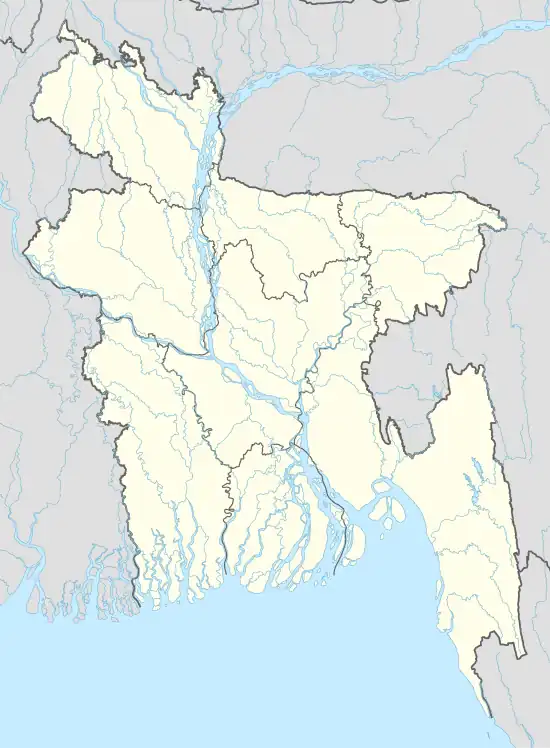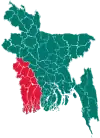Mirpur Upazila
Mirpur (Bengali: মিরপুর (কুষ্টিয়া)) is an upazila of Kushtia District in the Division of Khulna, Bangladesh.[1] Mirpur Thana was formed in 1885 and it was turned into an upazila in 1983.
Mirpur
মিরপুর (কুষ্টিয়া) | |
|---|---|
Upazila | |
 Mirpur Location in Bangladesh | |
| Coordinates: 23°56′N 89°0′E | |
| Country | |
| Division | Khulna Division |
| District | Kushtia District |
| Area | |
| • Total | 317.35 km2 (122.53 sq mi) |
| Population (2001) | |
| • Total | 330,115 |
| • Density | 1,000/km2 (2,700/sq mi) |
| Time zone | UTC+6 (BST) |
| Website | Official Map of Mirpur |
History
Mirpur was listed in the Ain-i-Akbari as a mahal in sarkar Mahmudabad.[2]: 133 It was listed with an assessed revenue of 2,370 dams.[2]: 133
The former Mirpur Thana, which was formed in 1885, became an upazila on 1 August 1983.[1]
Geography
Mirpur is located at 23.9333°N 89.0000°E. It has 48,215 households and a total area of 317.35 km2.
The upazila is bounded by Bheramara and Ishwardi upazilas on the north, Alamdanga and Kushtia Sadar upazilas on the south, Kushtia Sadar upazila on the east, Daulatpur, Gangni, and Alamdanga upazilas on the west.[1]
Demographics
According to 2011 Bangladesh census, Mirpur had a population of 330,115. Males constituted 50.14% of the population and females 49.86%. Muslims formed 97.79% of the population, Hindus 2.19%, Christians 0.002% and others 0.006%. Mirpur had a literacy rate of 41.86% for the population 7 years and above.[3]
At the 1991 Bangladesh census, Mirpur had a population of 266,046. Males constitute 51.76% of the population, and females 48.24%. The population aged 18 or over was 136,611. Mirpur had an average literacy rate of 21.3% (7+ years), compared to the national average of 32.4%.[4]
Administration
Mirpur Upazila is divided into Mirpur Municipality and 13 union parishads: Ambaria, Amla, Bahalbaria, Baruipara, Chhatian, Chithalia, Dhubail, Fulbaria, Kursha, Malihad, Poradaha, Sadarpur, and Talbaria. The union parishads are subdivided into 116 mauzas and 192 villages.[5][6]
Mirpur Municipality is subdivided into 9 wards and 9 mahallas.[5]
References
- Arif Nishir (2012), "Mirpur Upazila", in Sirajul Islam and Ahmed A. Jamal (ed.), Banglapedia: National Encyclopedia of Bangladesh (Second ed.), Asiatic Society of Bangladesh
- Abu'l-Fazl ibn Mubarak (1891). The Ain-i-Akbari. Translated by Jarrett, Henry Sullivan. Calcutta: Asiatic Society of Bengal. Retrieved 21 January 2021.
- "Bangladesh Population and Housing Census 2011: Zila Report – Kushtia" (PDF). Table P01 : Household and Population by Sex and Residence, Table P05 : Population by Religion, Age group and Residence, Table P09 : Literacy of Population 7 Years & Above by Religion, Sex and Residence. Bangladesh Bureau of Statistics (BBS), Ministry of Planning, Government of the People’s Republic of Bangladesh. Retrieved 9 December 2018.
- "Population Census Wing, BBS". Archived from the original on 2005-03-27. Retrieved November 10, 2006.
- "District Statistics 2011: Kushtia" (PDF). Bangladesh Bureau of Statistics. Archived from the original (PDF) on 13 November 2014. Retrieved 14 July 2014.
- মিরপুর উপজেলা সকল ইউনিয়ন সমূহ [Mirpur Upazila All Unions]. Bangladesh National Portal (in Bengali).
